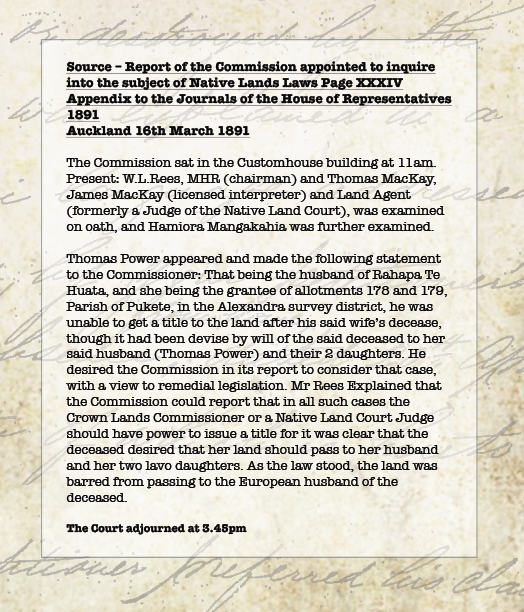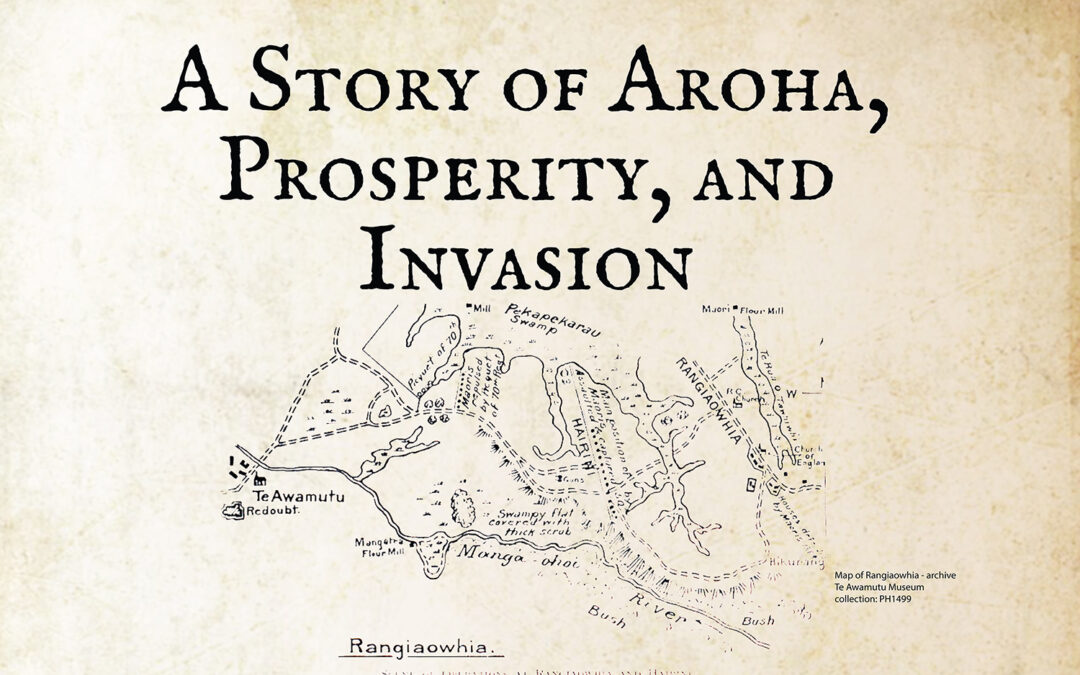Rangiaowhia, a small journey east of Te Awamutu, was a thriving and productive village until 1864. From the 1830’s Māori and invited European settlers worked collaboratively to develop this into one of the region’s most important agricultural areas.
One of the most significant relationships that nurtured prosperity for both Māori and settlers were between Rahapa Te Hauata and Thomas Power. The following is an extract from Thomas Power, set down by his son-in-law Thomas Moisley in 1938:
“In 1845 Sir George Grey sent Mr T Power to instruct the natives in agriculture and he made Rangiaowhia his headquarters. He brought down from Auckland horses, drays and ploughs, harrows, and cows. The first of these any sorts of implements in the Waikato. They used to bring goods up the Waipa River as far as the Puniu then up the Puniu River as far as what was the Ford Redoubt in the later years. Each settlement around Rangiaowhia and Pukeatua at that time was divided by a row of peach trees to mark their boundaries. That is how Rangiaowhia got such a name for peaches which were very luxurious in those days.”
Mr Power did not confine his efforts to Rangiowhia alone as there were a lot of large native settlements around. He used to visit pa situated on what is called Roto-o-Rangi, Pukekura, Maungatautari, Waimana, Aratetaha and up the Mangatutu stream, Korakonui and Mangarongi, and up the Waipa past Ōtorohanga. The countryside was full of settlements but Rangiaowhia was the most prosperous as they had more horses and implements than the others.”
“Under Thomas Power’s guidance a flour mill was erected on Rua-o-Tawhiwhi stream and a thriving farming industry established. In 1851 one hundred tons of flour from the district was sold in Auckland. With the proceeds horses, cattle, and machinery were purchased and each year a greater area of cultivation was developed.”
“As time went on more Europeans came and things were going on fine and prosperous until the trouble broke out between pāhekā and Māori, and all the white men that were living in the settlements were interred. When the troops came to Rangiaowhia Mrs Power went up a ladder with a child on her back and fixed a white flag on the chimney. It was a house of two storeys and stood on the left hand side of the road just past the first angle after leaving Hairini Cheese factory. When the officer in command found out who they were he put sentries on and they were never out any further than the garden til Mr Power came back.”
“After the war was over, all Rangiaowhia was cut up in soldier sections. Mr Power went to live in Kihikihi until Mrs Power died. She was a member of Ngāti Apakura. Mr Power died in Hamilton hospital in April 1897 and was buried at Rangiaowhia.”
Six months after Rahapa sent her letter to the Governor, Thomas sends this letter supporting Rahapa’s letter where she described the circumstances their family endured when Rangiaowhia was invaded. Thomas shared some of the court proceedings where he petitioned to gain compensation for the sacking of his farm and taking of stock and produce stating they had no way to support themselves and other whānau from Rangiaowhia.
This was a letter to a friend of the Powers who had employed them to develop a skill base to work the land which, through this training and support, created an economic return and distribution networks that reached as far as the Auckland product markets. After Rangiaowhia was sacked, the land lay ravaged, families had been moved off their working lands or their stock and ability to feed their families had been compromised. Along with the loss of skilled labour agricultural activities had slowed.
Sadly, there was a large proportion of Māori productive home lands that had been confiscated during the British Crown invasion of the Waikato, with no compensation.
Below is an excerpt from the Journals of the House of Representatives 1891, showing Thomas Power petitioning for the return of his land after Rahapa’s passing only to be rejected.

To his Excellency Sir George Grey
Governor of New Zealand
P.C E.C O.C
The humble petition of Thomas Power of Rangiaowhia upper Waikato – herewith that your petitioner has resided for the last twenty years at Rangiaowhia, where he has reared a family of five children and has lived comfortably and prosperously with until he was forced to go to Auckland on the 16th July 1863, on the breaking out of the war, taking three of his children with him, and leaving the other two with his wife at Rangiaowhia. That which your petitioner kept a store at Rangiaowhia for the last eighteen years, and at the time of his going to Auckland he left therein a large quantity of goods and was the owner of a very valuable property consisting of horses, cattle, fowls and pigs, (the later of which he made bacon for the Auckland markets) as also a great many farming implements, the whole of which he had to leave behind him at Rangiaowhia. That on your petitioners return on the 6th May 1864, he found that all his property, before name, had been either taken away or destroyed by the soldiers, which was explained in a letter in the Māori language addressed to your Excellency, by your petitioner’s wife during his absence from home dated 20th April 1865, a translation of which is here to answered.
That your petitioner referred his claim for compensation for the before named losses amounting in all to £1973 (pounds) – before Captain Beckham at the Compensation Court, but being unable to bring witnesses from Rangiaowhia, to substantiate this claims except three who happened to be in Auckland at the time, because of the want of the means, and his wife not being able to leave her family, your petitioner was unable to satisfy Capt. Beckham that some of his horses and cows were not still running at Rangiaowhia, and he has learned from the newspaper that in consequence of this Cap. Beckham has only awarded him the small sum of £356 (pounds) none of which is forthcoming.
That your petitioner has not since recovered any of the property lost during his absence. That when the troops arrived at Rangiaowhia on the 21st July 1864 during your petitioners forced absence, an old blind man and his wife, who came out of the whare in which the Native’s were burned, were sent by Lieut. General Cameron to your petitioner’s house for safety. General Cameron promising at the time that rations should be supplied for them, there and the, which promise was not fulfilled, nor could the petitioner, on his return, obtain any rations for them, although he made repeated applications, until 1st September 1865. Your petitioner having in the meantime a period of 18 months, had to keep and feed these poor old people solely at his own expense, not having received any assistance whatever, and that the hardship of the loss hereby incurred, is now especially severe.
The man and woman above referred to are mentioned in your petitioner’s wife’s letter before name. That 200 acres of land which has been in the possession of your petitioner’s wife and her forefathers generations, and which at the time of the first survey was allotted to your petitioner, and on which he has spent large sums of money in buildings, fencings, improving (O.C.) (E.C) has been cut up by the recent survey and allotted to men of Major Jackson’s company of Forest Rangers, and that your petitioner does not know they day when he may be ordered to leave the house he lives in and the ground he has cultivated, be taken from him by the person’s who have drawn it in their farm sections and, your petitioners after 20 years residence thrown upon the world without a home for himself and family he having being cautioned by Major Jackson of the Forest Rangers, not to cultivate or fence as the land has been drawn up for numbers of his company.
That your petitioner humbly praise that your Excellency will mercifully consider the peculiar hardships of his case, and that you will in your wisdom order such steps to be taken, as will secure him a recompense for the great losses he has sustained during the war, he being greatly reduced in circumstances and having a large family to maintain and that you will be pleased to prevent himself and family being turned out of their house and home, as afford him some other means of supporting them, and is duty bound your petitioner will forever pray.
Thomas Power
Rangiaowhia
25th October 1865


